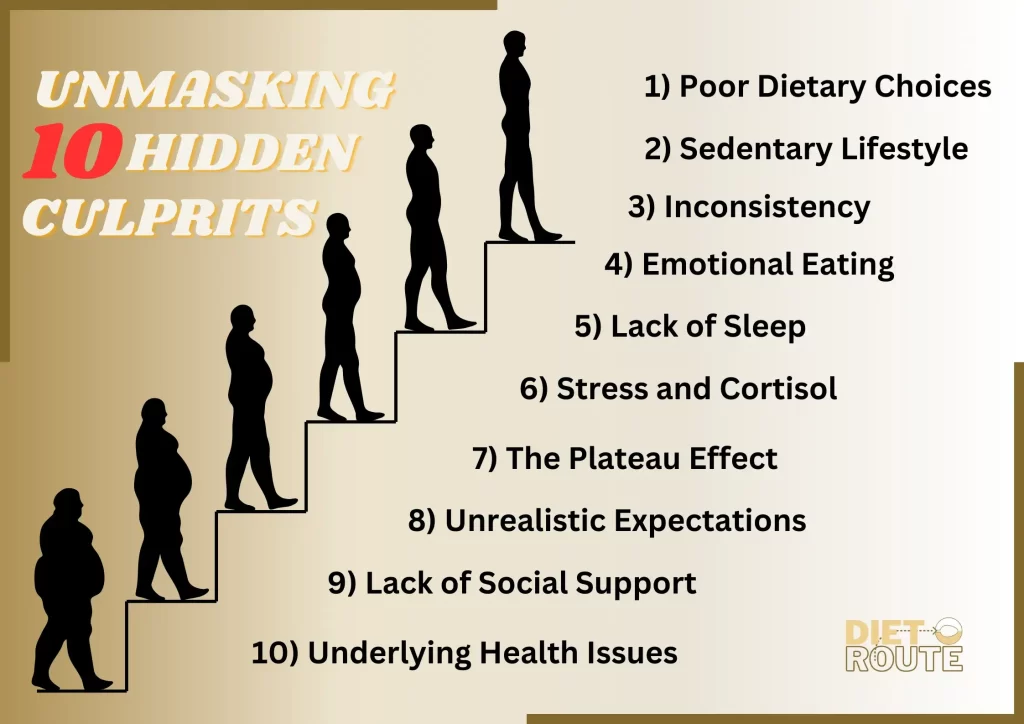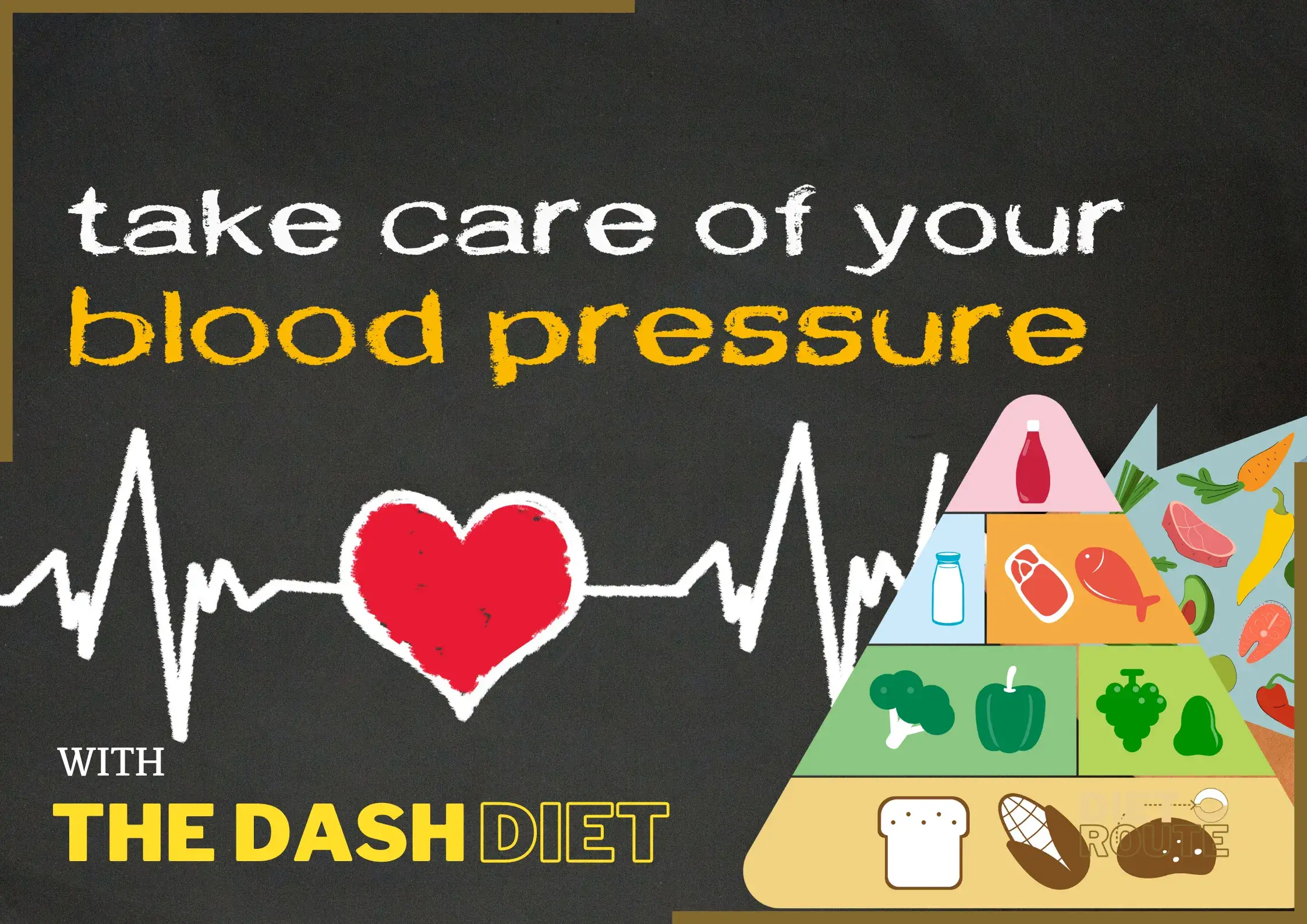Table of Contents
“Starting is the only approach to reach your weight loss goals. Never look back after taking the first step toward a better you.” – Diet Route
Introduction
Starting a weight-loss journey can feel like navigating a maze filled with hidden obstacles. Regardless of our good intentions and focused efforts, progress often comes to a halt, leaving us dejected and wondering what is causing our failures. In this post, we’ll look at the unseen culprits who stymie our efforts to shed pounds.
We hope that by shining light on these hidden obstacles, we may provide you with the knowledge and insight you need to overcome them and reach your actual weight loss potential. So buckle up as we go into the depths of these covert foes, uncovering the mysteries that lurk beneath the surface and hinder our road to attaining our weight loss goals.
Understanding the Caloric Balance Equation

The concept of the caloric balance equation is crucial in the domain of weight loss. This equation is the underlying concept that determines whether we gain, lose, or maintain our weight. To understand how this equation works, we must first look at its basic components.
The caloric balance equation is mostly about energy intake and expenditure. Simply explained, weight loss occurs when the calories burned exceed the calories consumed. When there is an excess of calories consumed compared to calories burned, weight gain occurs. This careful balance of energy intake and expenditure is essential for achieving and maintaining weight loss.
The energy intake factor is concerned with the calories we ingest through food and beverages. To effectively manage our weight, we must have an accurate grasp of the calorie composition of the foods we consume. Excessive calorie consumption above our body’s energy requirements might lead to weight gain.
Energy expenditure, on the other hand, refers to the calories burned through physical activity and body systems such as metabolism. Regular exercise and an active lifestyle increase our energy expenditure, which aids in weight loss. Furthermore, elements such as basal metabolic rate (BMR) and thermic effect of food (TEF) play a part in determining our overall energy expenditure.
It is critical to create a balance between energy intake and expenditure in order to maintain a healthy weight. We generate the conditions for weight loss by creating a calorie deficit (consuming fewer calories than we burn). This deficiency causes our bodies to draw on their fat reserves to compensate for the energy deficit, resulting in progressive and sustainable weight loss.
While the caloric balance equation provides a framework for weight management, it is crucial to remember that individual characteristics such as metabolism, body composition, and hormonal considerations can all have an impact on how it is used. Furthermore, caloric quality, including macronutrient composition and nutrient density, influences overall health and weight loss outcomes.
In the parts that follow, we will look at hidden culprits that might sabotage our weight loss efforts, slowing our progress despite our best efforts to maintain a calorie deficit. We may overcome obstacles and achieve our weight-loss goals more efficiently if we identify and handle them.
Unmasking 10 Hidden Culprits

1) Unmasking Hidden Culprit: Poor Dietary Choices
Our dietary choices have a big impact on weight loss. Poor dietary choices might be hidden culprits, sabotaging our progress and hampering our weight loss goals. Excessive consumption of high-calorie, processed meals, sugary beverages, and unhealthy snacks can contribute to weight gain and thwart our efforts to shed those extra pounds.
To tackle this hidden culprit, it is critical to prioritize healthier food choices. Choose meals that are high in vitamins, minerals, and fiber while being low in calories. Consume a mix of fruits, vegetables, whole grains, lean proteins, and healthy fats. You are not only nourishing your body, but you are also creating an environment favorable to weight loss.
2) Unmasking Hidden Culprit : Sedentary Lifestyle
Sedentary lifestyles are becoming more common in today’s modern environment. A sedentary lifestyle is characterized by long hours spent sitting at desks, driving, and indulging in leisure activities that require little physical activity. This hidden cause can stymie weight-loss progress by lowering overall energy expenditure and delaying metabolism.
It is critical to incorporate regular physical activity into our daily routines to counteract the detrimental consequences of a sedentary lifestyle. Engage in activities that raise your heart rate and burn calories, such as brisk walking, jogging, cycling, swimming, or taking exercise classes.
Find ways to incorporate activity throughout the day, such as taking the stairs instead of the elevator, parking farther away and walking, or performing housework. You may increase your energy expenditure, boost your metabolism, and improve your weight loss results by leading a more active lifestyle.
3) Unmasking a Hidden Culprit: Inconsistency
A key component of achieving sustainable weight loss is consistency. Unfortunately, a lack of consistency can be a hidden culprit, inhibiting our progress and preventing us from reaching our weight loss goals. Setbacks and swings in weight might be caused by irregular eating patterns, occasional exercise regimens, and inconsistent commitment to healthy behaviors.
It is critical to build consistent habits and routines in order to overcome this hidden culprit. Create a meal plan that includes balanced, portion-controlled meals throughout the day. Make regular exercise a priority in your schedule and set aside special time for it.
Maintaining consistent sleep patterns and stress management strategies is also important, as these aspects influence weight loss outcomes. You lay the groundwork for sustainable weight loss progress by placing a high priority on consistency.
In the parts that follow, we will continue to uncover and address other hidden culprits that stymie weight loss success. You can retake control of your weight loss journey and obtain long-term results by knowing and conquering these obstacles.
4) Unmasking Hidden Culprit: Emotional Eating
Emotional eating is a hidden factor that frequently undermines our weight-loss goals. Many people use food to cope with emotions like stress, sadness, boredom, or even happiness. Using food as a source of consolation, on the other hand, might lead to excessive calorie consumption and impede weight loss progress.
To manage emotional eating, it is critical to create alternate coping strategies. Find healthy stress outlets, such as relaxation techniques, mindfulness, or meditation, or engage in things that offer you joy and fulfillment. Seek aid from friends, family, or a professional to understand and manage your emotions without turning to food. You can regain control of your eating habits and help your weight loss journey by addressing emotional eating tendencies.
5) Unmasking Hidden Culprit : Lack of Sleep
Beyond rest and recuperation, quality sleep is important. Inadequate sleep can be a hidden culprit, negatively affecting weight loss efforts. Sleep deprivation alters hormonal balance, resulting in increased hunger and cravings, decreased fullness, and altered metabolism.
Prioritize a consistent sleep pattern and aim for the recommended 7-9 hours of quality sleep each night to combat this hidden culprit. Make your environment sleep-friendly, build a peaceful evening routine, and minimize your exposure to electronic gadgets before bed. You can improve your overall well-being and weight loss results by prioritizing enough sleep.
6) Unmasking Hidden Culprit : Stress and Cortisol
Stress can be a major impediment to weight loss. When we are stressed out on a regular basis, our bodies release the hormone cortisol, which can lead to weight gain and sabotage weight loss efforts. Furthermore, as previously stated, high levels of stress can lead to emotional eating, further impeding our progress.
It is critical to incorporate stress management practices into our daily lives in order to overcome the hidden causes of stress. Engage in stress-reduction activities such as yoga, meditation, deep breathing exercises, or spending time in nature. Make time for self-care and things that bring you joy and help you unwind. You can reduce the influence of cortisol on your weight loss journey and build a healthier mind and body by appropriately controlling stress levels.
We will continue to find and address additional hidden culprits that may be impeding your weight loss goals in the following sections. You may set yourself up for success and attain sustainable weight loss results by knowing and proactively addressing these obstacles.
7) Unmasking Hidden Culprit : The Plateau Effect
A typical hidden issue that might stymie weight loss progress is the plateau effect. After initial success, it is not uncommon for weight loss to plateau and further progress to become difficult. This plateau effect can be discouraging and frustrating.
To break through the plateau, suitable adjustments must be made. To begin, review your calorie intake to verify you are still in a calorie deficit. To boost metabolism and encourage muscle growth, consider altering your exercise routine by including new activities, increasing intensity, or adding strength training.
To keep motivated, focus on non-scale achievements such as improved energy levels, fitness, or body measurements. Remember that plateaus are a common part of the weight loss journey, and you may overcome them with perseverance and modifications.
8) Unmasking Hidden Culprit : Unrealistic Expectations
Unrealistic expectations can hinder our weight-loss efforts and play a hidden role. Expecting rapid and extreme weight loss, which is frequently encouraged by societal expectations or inaccurate media portrayals, can lead to disappointment and a sense of failure.
Setting realistic and attainable goals is critical for defeating this hidden villain. Aim for a weekly weight loss of 1-2 pounds that is gradual and sustainable. Celebrate minor victories along the road and concentrate on overall progress rather than the number on the scale. Remember that weight loss is a journey, and embracing a long-term, healthy lifestyle is more essential than hitting a precise figure.
9) Unmasking Hidden Culprit : Lack of Social Support
Starting to accomplish weight loss goals without social support might be difficult. Friends, family, and peers who do not encourage and understand us can undermine our motivation and stymie our progress.
Seek out people who have similar goals or join supportive networks to uncover the hidden culprit of a lack of social support.
Participate in group fitness classes, find a partner for accountability, or consider joining online forums or support groups. Surrounding yourself with like-minded people who offer encouragement, motivation, and understanding can have a huge impact on your weight loss journey and keep you on track.
10) Unmasking Hidden Culprit: Underlying Health Issues
Despite our best efforts, underlying health issues can often stymie weight loss goals. Hormonal imbalances, thyroid problems, insulin resistance, and other medical factors can all alter metabolism, making weight loss more difficult.
It is critical to contact a healthcare professional if you suspect an underlying health concern. They can assess your health, do essential tests, and, if necessary, provide appropriate guidance and treatment. You may maximize your weight loss goals and improve your overall well-being by addressing and controlling any underlying health concerns.

In A Nut Shell
Finally, our weight loss goals can be littered with hidden culprits that stymie our progress and make it tough to attain our goals. We have descended into the depths of these obstacles, unmasking and tackling them one by one throughout this post.
We investigated the elements that can stymie weight loss success, ranging from poor dietary choices and a sedentary lifestyle to a lack of consistency and emotional eating. In addition, we have shed light on the importance of proper sleep, stress management, and social support in overcoming these barriers. We’ve also talked about how unreasonable expectations, plateaus, and underlying health concerns affect our weight loss goals.
We may negotiate the challenges of weight loss and set ourselves up for sustainable success by recognizing and addressing these hidden culprits. It is crucial to note that each person’s journey is unique, and there may be other elements at play that must be considered. However, armed with knowledge, determination, and a supportive mindset, we may overcome these obstacles and realize our true potential for reaching our weight loss goals.
Key Takeaways
1. The caloric balance equation, which states that calories burned must exceed calories consumed, is the foundation of weight loss goals.
2. Poor dietary choices, such as eating high-calorie processed meals, might stymie weight loss goals.
3. A sedentary lifestyle lowers overall energy expenditure and decreases metabolism, making weight loss more difficult.
4. Sustainable weight loss requires consistency in healthy weight loss practices such as nutrition, exercise, sleep, and stress management.
5. Emotional eating can stymie progress, so learning new coping mechanisms is critical.
6. Inadequate sleep disturbs hormonal balance and can lead to increased hunger and cravings, making weight loss goals difficult.
7. Chronic stress and cortisol release can both contribute to weight gain and thwart weight loss goals.
8. Plateaus are normal, but they can be overcome by reevaluating calorie intake, changing exercise regimens, and focusing on non-scale successes.
Frequently Asked Questions (FAQs)
-
1. What is the caloric balance equation?
The caloric balance equation is based on the idea that weight loss happens when the calories expended by physical activity and metabolism exceed the calories absorbed by food and drink. By producing a calorie deficit, the body uses stored fat for energy, which leads to achieving weight loss goals.
-
2. What are some instances of poor dietary choices that make weight loss goals difficult?
Consuming high-calorie processed foods, sugary beverages, unhealthy snacks, and foods high in saturated fats are all examples of poor dietary choices that can stymie weight loss. These choices provide minimal nutrition while packing a calorie punch, making achieving a calorie deficit more difficult.
-
3. What effect does a sedentary lifestyle have on weight loss goals?
A sedentary lifestyle, defined by prolonged sitting and little physical activity, might sabotage weight loss goals. It reduces overall energy expenditure and slows metabolism, making calorie burning and weight loss more difficult. Regular physical activity is required to counteract the effects of a sedentary lifestyle.
-
4. For sustainable weight loss, why is consistency crucial?
Because it creates healthy habits and routines, consistency is essential for sustainable weight loss. Following a balanced diet on a consistent basis, engaging in regular exercise, getting enough sleep, and managing stress all contribute to a weight-loss-friendly atmosphere. It aids in the maintenance of a calorie deficit and promotes long-term progress.
-
5. How do I overcome emotional eating?
Finding alternative coping mechanisms for regulating emotions is necessary for overcoming emotional eating. Engaging in stress-relieving activities such as exercise, mindfulness, or meditation, seeking assistance from friends or professionals, and redirecting emotional energy toward hobbies or self-care can all aid in breaking the cycle of emotional eating.
-
6. What is the importance of sleep for weight loss goals?
Sleep is very important for accomplishing weight loss goals. Insufficient sleep alters hormonal balance, resulting in increased hunger and cravings, decreased fullness, and altered metabolism. Prioritizing quality sleep and aiming for the recommended 7-9 hours of sleep per night will help with weight loss.
-
7. What effect does prolonged stress have on weight loss goals?
Chronic stress causes the release of cortisol, a hormone that can both contribute to and impede weight loss goals. Cortisol levels that are too high might increase hunger, especially for high-calorie foods, and encourage fat storage around the abdomen. Managing stress through relaxation techniques, exercise, and self-care is critical for weight loss success.
-
8. How do I get through a weight-loss plateau?
Making changes is required to break past a weight-loss plateau. Reassessing calorie intake, including new workouts or raising intensity, incorporating strength training, and focusing on non-scale successes can all help jumpstart weight loss goals again. During this stage, perseverance, patience, and establishing sustainable lifestyle changes are key.
-
9. How can I keep my expectations in check during my weight loss goals?
Setting realistic and reachable weight loss goals is part of managing expectations. Understand that healthy weight loss is slow, with a weekly goal of 1-2 pounds. Celebrate non-scale accomplishments such as more energy, improved fitness, or garment size changes. Maintaining motivation is made easier by focusing on overall progress and having a long-term perspective.
-
10. What should I do if I feel that an underlying medical condition is impeding my weight loss goals?
Consult a healthcare professional if you feel an underlying health condition is interfering with your weight loss goals. They can assess your health, do pertinent tests, and offer guidance or treatment that is specifically suited to your condition. Addressing any underlying health issues can help maximize weight loss efforts.




